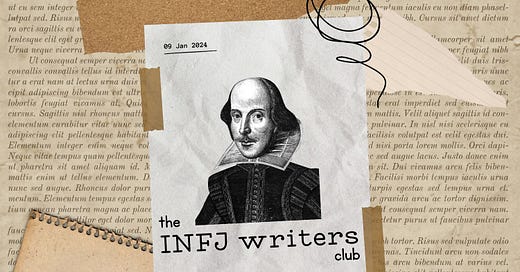Observation:
(I say that to let myself off the hook even a little. No need for proper introductions. Just go. Also, this week I’ve been leaning toward a notebook-y / “what I’ve discovered over the last fortnight” feel for club pieces at Maison d’Evangeline1 (and that might not even make sense, but if it does, let me know what you think). I’m making this up as I go. If that’s not obvious.)
Okay, back to it. Abruptly.
Observation:
We’re a contradictory bunch.
INFJs, I mean.
We aim for the ideal in nearly every situation, but somehow miss the probability that that might actually require more from us than the status quo.
I read an article recently about the late Charlie Munger called, “The Munger Operating System: How to Live a Life That Really Works.”2
The first rule/principle?
“To get what you want, deserve what you want.”
Ouch.
We want to be writers.
Writers write.
We want to be good writers.
Good writers write a lot.
We want to be successful writers (and for INFJs that generally means that our writing influences others for the better).
Successful writers write and publish (meaning, share) a lot. (Because without sharing, no one sees it, and if no one sees it, no one can be influenced by it.)
We’re all writers here (even if currently the wannabe kind). Let’s use a well-known fiction template:
A character (that’d be us) wants something (to be successful writers) and has to overcome conflict and obstacles (both external AND internal) to get it.
From The Conflict Thesaurus3 (an actual book, I didn’t make that up):
In fiction, conflict is the crucible that tests, bruises, and shapes our characters. Externally, it pushes the plot onward by supplying the resistance needed to force characters to scrutinize their world, make choices, and take action to get what they want. Internally, conflict generates a tug-of-war between the character’s fears, beliefs, needs, values, and desires. Ultimately, it forces them to choose between an old, antiquated way of thinking and doing, or a new, evolved way of being, because only one will help them get what they want.
So is there any way to avoid being a better version of ourselves?
Not that we don’t scrutinize ourselves at every turn; we just focus on the wrong thing, we with our perfectionism and our ideals.
We see what it should look like, and when we compare that to what’s on the page in front of us we think, “This is not that.” This—what’s in front of us—is our only focus, and how it lacks in every way. We never think, “Who would I have to be in order to achieve that?” (and then act accordingly).
I was reading Ann Patchett’s This Is the Story of a Happy Marriage4 and her essay, “The Getaway Car,” which you should definitely read. I pulled out this snippet from her reference to writer (and Patchett’s former teacher), Grace Paley:
“… to be better people than we were … the chances of our becoming real writers depended on it.”
Maybe writing itself isn’t the problem, it’s becoming the kind of person we have to be in order to do it.
the INFJ writers club at Maison d’Evangeline
P.S. I’ve noticed the new subscribers and panicked a little with each one, more on that with this Sunday’s first ever fortnightly INFJ writers club newsletter (and really, with a title like that, how could you miss it?). Even though it does freak me out a little (it puts me on the hook that much more), I’d love it if you read along, passed it along, and added your thoughts to the discussion (this is a club, and you should have a say!). My goal is to create a place of encouragement and support so that we can help each other get off the wall and make a go of this writing thing. And maybe even make some like-hearted friends while we’re at it from all around this little planet.🌎
FOOTNOTES
Dispatches, essays, etc. from the INFJ writers club and the Bibliotherapy club at Maison d’Evangeline on Substack







